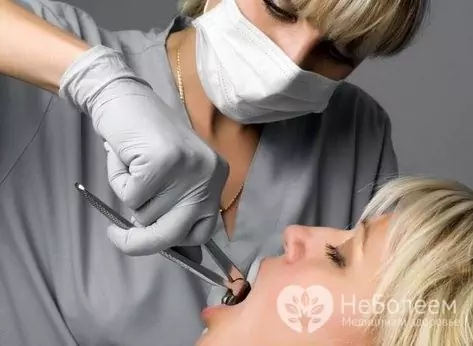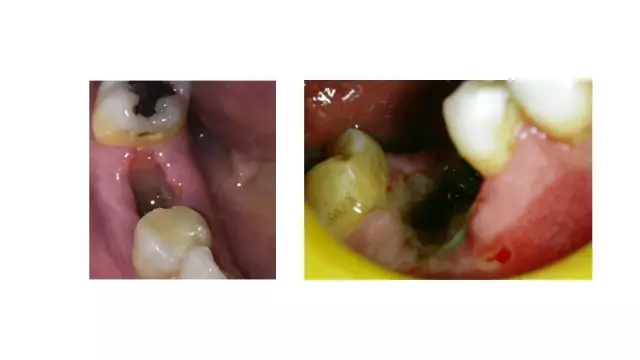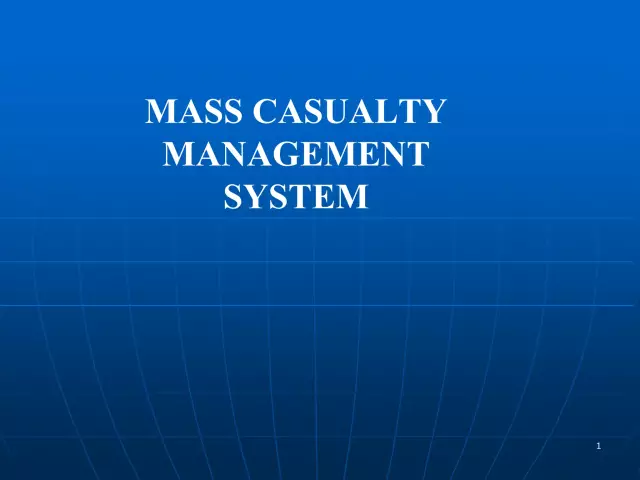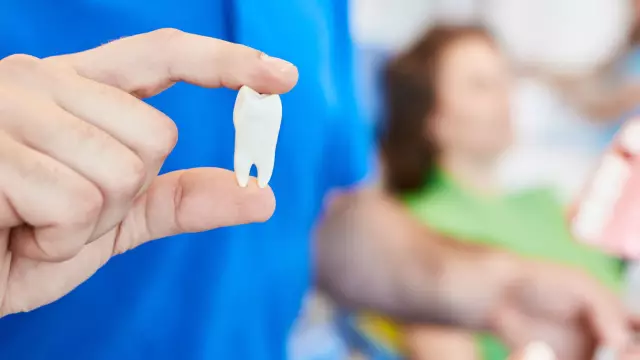- Author Rachel Wainwright wainwright@abchealthonline.com.
- Public 2023-12-15 07:39.
- Last modified 2025-11-02 20:14.
Removal of a tooth
Tooth extraction several centuries ago and today

Such a well-known and, frankly, unpleasant procedure like tooth extraction has a completely official medical name - exodontics. It has been used by humans since ancient times, but it should be noted that several centuries ago, tooth extraction was used mainly for bloodthirsty purposes - to intimidate and torture unwanted people. Over time, the functions of exodontics have changed somewhat, but this has not made it less dangerous. Until the discovery of antibiotics and adequate instrumentation, tooth nerve extraction and other dental procedures were associated with a very real risk of death. Simply put, people often died from various infections that were brought in by home-grown Aesculapius.
For the first time, a more or less safe method of tooth extraction was discovered by the medieval dentist Guy de Choliak. He invented the "dental pelican" - an original device with which it was possible to gently extract a damaged tooth along with a root. Thanks to the pelican, it was even possible to remove a wisdom tooth, which, so you know, is one of the most difficult and time-consuming procedures in dentistry. Guy de Chaoliac's "Dental Pelican" was popular until the end of the 18th century, when it was replaced by more modern technologies and tools.
Today, the extraction of teeth and nerves continues to be a responsible and complex operation that requires a certain level of qualification from the performer. In addition, after the forced extraction of a damaged tooth, a person often has serious complications. For this reason, dentists prefer to resort to surgery only when it is really necessary, in order to save patients from infections, inflammation and other risks.
The main reasons for tooth extraction
- significant damage to the tooth by caries or the development of infection;
- gum disease spreading to healthy tissues of the jaw apparatus;
- tooth decay as a result of accidents, fights and other external influences;
- tooth extraction is performed even if it interferes with the normal growth of other teeth;
- a special case is the extraction of a wisdom tooth, which, in the case of improper germination, can change the symmetry of the face and the bite.
Tooth extraction methods
Nowadays, two methods of tooth extraction have become widespread - simple and surgical. The first involves extracting the visible tooth under local anesthesia. During the tooth extraction procedure, the dentist uses special tools that allow the tooth to be lifted and pulled out of the cavity. Before this, the tooth is loosened in order to disrupt the integrity of the periodontal tissues and to facilitate the task.
The surgical method of tooth extraction is used in cases where access to the damaged tooth is difficult, for example, when it has not erupted to the end or has a broken crown (upper part). Before starting the operation to remove a tooth, the dentist must conduct a complete examination of the patient in order to choose the optimal method of intervention. In some cases, it will be advisable to dissect the jawbone, and in others, it will be limited to only excision of soft tissues. Note also that in some situations it is impossible to extract a tooth (complications lead to too serious consequences). In such cases, the dentist decides to crush the tooth and extract it piece by piece.
Features of wisdom tooth extraction
The wisdom tooth is often the cause of health problems due to the fact that it cannot erupt normally. This leads to discomfort when chewing food and other serious consequences, in particular: an increased risk of infections, the development of an inflammatory process, swelling and pain. If the wisdom tooth is not removed in time, complications, sooner or later, will affect healthy tissues, and will begin to promote the development of tumor and cystic processes. Timely extraction of a wisdom tooth will save you from such problems and will allow you to maintain healthy teeth and an attractive smile for many years. Please note only that the removal of a wisdom tooth should be done only by professionals, since its roots are located deep in the gums and have the most bizarre shapes, which greatly complicates the extraction process.
We will briefly tell you about the possible problems that appear after the removal of a wisdom tooth:
- pain syndrome, the appearance of edema in the soft tissue area;
- prolonged bleeding;
- socket inflammation;
- difficulty opening your mouth;
- trauma to the nerves, leading to numbness of the lips, teeth and mouth;
- damage to dentures or adjacent teeth;
- fracture of the jaw, caused by the great pressure that the surgeon puts on the damaged area of the mouth.
If an incorrect tooth extraction has occurred, complications sometimes have very, very serious consequences. For example, inflammation can begin to spread to healthy tissue. Of course, this leads to new problems and the next removal of damaged teeth.
What to do if a tooth hurts after extraction?

Any intervention, not to mention such a serious procedure as the extraction of a tooth nerve, entails pain and discomfort. However, you can minimize negative consequences if you adhere to simple rules:
- refrain from eating food for at least 3 hours after tooth extraction;
- on the day of the operation, postpone the planned trip to the sauna or bath;
- do not eat food that is too hot;
- do not touch the itchy area with your tongue or any foreign objects;
- give up brushing your teeth for 2-3 days;
- limit physical activity as it can cause new bleeding.
Many people strive to get out of the dental chair immediately after their wisdom tooth is removed. Should not be doing that. Even after a simple extraction, the patient should sit quietly for 10-15 minutes. In the case of surgical intervention for tooth extraction, it is better to extend this period to one hour, so that the blood has time to thicken and close the wound. In addition, for a few days after tooth extraction, you must follow all the doctor's recommendations and provide postoperative oral care. For severe pain, you should take pain relievers (except aspirin and aspirin-containing drugs that thin the blood).
If you did everything correctly, but still there are complaints like "a tooth hurts after extraction", then this means that you are developing any complications. In this case, it is necessary to consult a doctor again to prevent adverse changes and, possibly, reoperation.
YouTube video related to the article:
The information is generalized and provided for informational purposes only. At the first sign of illness, see your doctor. Self-medication is hazardous to health!






